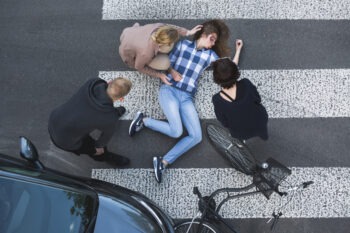
Florida’s sunny skies and warm sandy beaches attract thousands of people yearly to the Sunshine State. Outdoor activities, such as relaxing at the beach, exploring the boardwalk, or taking an afternoon walk, are among Florida residents’ and visitors’ many favorite pastimes. No one expects a fun afternoon adventuring to turn into a terrifying night in the emergency room. However, pedestrian accidents happen — maybe more than you’d think.
According to a study completed by the Governors Highway Safety Association, Florida was ranked the second-highest state in the United States for pedestrian accidents and pedestrian accident fatalities. Approximately 7,485 pedestrian fatalities in the United States in 2021; however, 899 deaths occurred in Florida, averaging 12% overall.
Florida pedestrian accident laws require motorists and pedestrians to be careful and watch their surroundings to avoid preventable accidents. However, severe or life-threatening accidents happen when one or both parties fail to follow the rules or inspect their surroundings.
What Are the Laws for Pedestrian Accidents in Florida?
Since Florida currently remains the second highest for pedestrian accidents and fatalities in the United States, it is essential to be aware of Florida’s pedestrian accident laws. The laws for Florida pedestrian accidents are outlined in Chapter 316 Section 130 of the Florida Statutes and require pedestrians to obey traffic signs unless directed by a police officer. Furthermore, pedestrians must use sidewalks or crosswalks when available and avoid walking on the road.
However, in most cases, pedestrian accidents are not caused by pedestrians but by drivers who fail to drive safely. While you may think that many pedestrian accidents occur at intersections, more often than not, pedestrian accidents happen on sidewalks, crosswalks, or even on the side of the road. Pedestrian accident victims typically endure severe or fatal injuries that could permanently alter their physical or mental well-being.
Knowing the Florida pedestrian accident laws makes it easier to follow them and avoid hurting yourself or another person while on the road. A few of the main pedestrian accident laws to note while in Florida include but are not limited to the following:
- Pedestrians are categorized as anyone walking on foot. This term applies to walkers, runners, skaters, and people in wheelchairs; however, bicycles are not included in this category.
- Pedestrians must always follow traffic signs unless otherwise directed by a police officer. If there are no traffic signs, pedestrians must obey other rules.
- Pedestrians must use sidewalks or crosswalks, not the roadway.
- If no sidewalks or present, pedestrian traffic must walk on the shoulder, not in the roadway.
- Pedestrian traffic must not interfere with traffic or stand in the middle of the road.
- Pedestrian traffic must yield to oncoming traffic except when a traffic signal indicates it is their turn via the crosswalk.
Where Are the Most Dangerous Florida Cities for Pedestrian Accidents or Fatalities?
Florida stays busy year-round due to the large influx of travelers visiting beaches, amusement parks and enjoying other outdoor activities. While Florida is a large state, there are certain places where travelers or residents are more likely to be affected by a pedestrian traffic accident.
The following places in Florida are large cities, where many people may rely on transportation by foot rather than by car due to lack of parking or other reasons.
- Orlando, Kissimme, Sanford
- Deltona, Daytona Beach, Ormond Beach
- Palm Bay, Melbourne, Titusville
- North Port, Sarasota, Bradenton
- Lakeland/Winter Haven
- Jacksonville
- Cape Coral/Fort Myers
- Tampa, St. Petersburg, Clearwater
Though many of these cities in Florida have adequate accommodations for pedestrians, pedestrian accidents still occur when drivers ignore traffic signals. Pedestrians hurt or killed during a Florida pedestrian accident may be eligible for compensation from liable parties to recover out-of-pocket damages like medical bills or funeral expenses.
Florida Pedestrian Accidents & Comparative Fault
According to Florida pedestrian accident laws, if a driver is at-fault for an accident, they will be liable for the accident and subsequent damages. In Florida, fault is determined by the “negligence standard,” or how much percentage of guilt you contributed to the accident. This law is accompanied by the comparative fault law, which dictates how much of the accident was caused by each party and how they contributed to the accident.
The comparative fault law affects your eligibility for compensation after a pedestrian accident in Florida. If both parties share a percentage of the fault for the accident, your compensation could be reduced by the amount of your fault. For example, if you contributed 30% of fault to the accident, your pedestrian accident claim may be reduced by 30% in Florida.
Determining fault after a pedestrian accident in Florida can be difficult. If you’re unsure who is at fault, a personal injury lawyer from Fasig | Brooks can investigate your claim and determine who could be responsible for violating pedestrian accident laws in Florida.
Florida Pedestrian Accident FAQs
After a pedestrian accident in Florida, it is understandable that you may not know what to do. If this is your current situation, we are so sorry. Car accident lawyers have the answers you need to move on after a severe or life-threatening accident.
You may be unable to work or pay your bills. You may require numerous medical treatments and wonder who will care for your children. Florida personal injury attorneys can help you win the compensation you deserve after a pedestrian accident.
What Is the Average Settlement Amount for a Pedestrian Accident in Florida?
There is no average settlement for pedestrian accidents in Florida. The settlement amount that you may receive after a successful claim will be based on the circumstances surrounding your case. Factors influencing how much you could win include who was at fault, if you share partial fault and the types of injuries you suffered from the accident.
How Are Pedestrian Accidents Caused in Florida?
Though many factors contribute to pedestrian accidents, these accidents usually occur in busy areas at night on the weekend, specifically Saturday nights. To avoid a personal injury or harming another person, be careful of your surroundings and stay within well-light areas if you need to travel by foot on sidewalks or crosswalks.
Florida Personal Injury Lawyers Can Help You
No one expects a fun vacation to end abruptly with a Florida pedestrian accident. However, these types of accidents occur more often than you might think. You have options if you’ve been injured by another’s reckless behavior while traveling on foot.
Personal injury lawyers in Florida can help you get your life back by filing a claim to hold the responsible party accountable for their negligence. By doing so, you could recover economic and non-economic damages like medical bills, pain and suffering, and lost wages.
Don’t wait if you’ve been affected by a pedestrian accident. Learn more about your options by contacting a personal injury lawyer from Fasig | Brooks to learn if you could be eligible for compensation.




